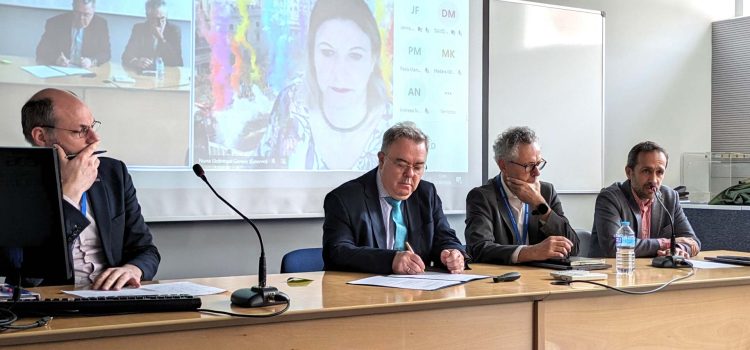
Last week, JEDI (Joint European Degree Label in engineering) brought together over fifty representatives from EELISA, ENHANCE, and EUt+ – alliances associated with JEDI – along with members of the European Commission and external stakeholders at the Escuela Técnica Superior de Ingeniería y Diseño Industrial (ETSIDI) of the Universidad Politécnica de Madrid. The gathering aimed to celebrate the completion of this project after a year of progress. It was two intense days where partners presented conclusions, challenges, and the feasibility of developing and implementing Joint European Degrees in the field of engineering in Europe.
The first day began with welcoming remarks from ETSIDI Director Isabel Carrillo and EELISA Deputy Vice-Rector Ignacio González, who highlighted the hard work that the 16 universities involved in JEDI have put in over the past months. On this first day, roundtable discussions addressed more operational aspects of the project, such as the difficulties encountered in developing the joint degree, including the diverse national legislations and definitions of engineering and regulated professions in each country. As a result, the consortium emphasized the need to harmonize criteria across different countries and to simplify accreditation processes so that joint degrees can become a reality in the short or medium term in Europe.
The focus of the second day was on the future, both of JEDI and the European Commission’s strategy to create joint degrees. This task, as partners explained, is not straightforward, as it requires systemic changes that allow for flexibility and innovation without compromising program quality or the autonomy of higher education institutions. Establishing a framework for common criteria is an important step, and the possibility of harmonizing basic aspects would be crucial.
Beyond the agenda of this meeting, the alliances expressed their intention to continue collaborating to redefine engineering education in Europe. UPM Rector Guillermo Cisneros echoed this sentiment, stating, “JEDI is the first step in working together, not only for the alliances present here but for all those dedicated to engineering in Europe. We must be the best demonstrators and we must influence the European landscape. JEDI has provided a solid foundation for engineering education analysis, and I am confident that it will soon become a reality,” he concluded at the event’s closure.


